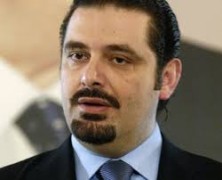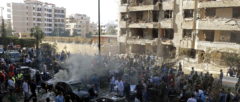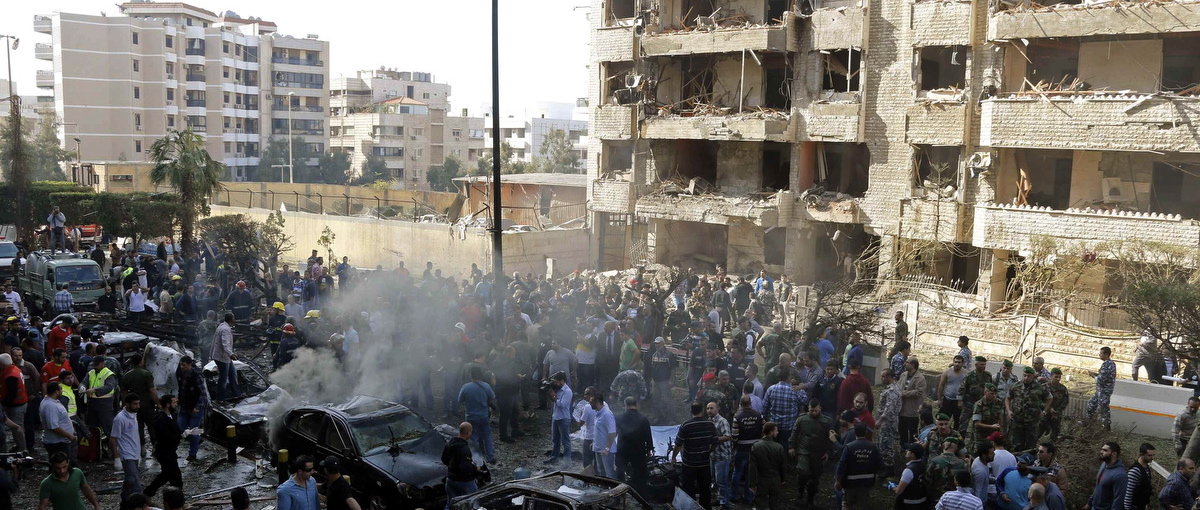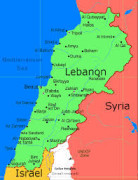Shortly after the eruption of the popular uprising in Syria, in March 2011, the prime minister of neighboring Lebanon, Najib Mikati, announced he would hew to a policy of neutrality, or “disassociation”, so that his nation would not be dragged into the bloody mayhem of that conflagration.

Lebanon, he declared, would support neither the Baathist regime of President Bashar Assad nor the patchwork of secular and Islamist rebels trying to overthrow him.
It seemed like a sensible decision, but two and a half years on, he has discovered that Lebanon is powerless to shield itself from the poisonous spillover of the civil war in Syria.
The fighting in Syria, which has claimed at least 120,000 lives, has not only created a monumental refugee crisis in Lebanon — which marked its 70th anniversary of independence this year — but renewed sectarian tensions pitting Lebanese Sunni Muslims against Shiite Muslims.
For a country that was badly fractured by a 15-year civil war, which ended in 1990, the prospect of further instability and strife is something that even hardened Lebanese find intolerable, if not unbearable. Yet in the past few months, in particular, these forces have buffeted Lebanon, which has been subjected to an influx of yet more Syrian refugees, badly straining its infrastructure, and an upsurge of bombings, exacerbating existing sectarian tensions.
According to the United Nations, 600,000 Syrians have poured into Lebanon. This means that Syrian nationals now comprise up to one-quarter of Lebanon`s population of four million. By all accounts, however, an additional 500,000 Syrian refugees, who have not even bothered to register with the authorities, are reportedly living in Lebanon.
Of course, Lebanon is not the sole Arab country feeling the effects of this mass movement of Syrian nationals fleeing the horrors of a fratricidal war. Five hundred thousand Syrians have streamed into Jordan, 400,000 into Turkey, 175,000 into Iraq and 90,000 into Egypt.
It’s already clear that the Syrian refugees have had a detrimental impact on Lebanon, which was inundated by tens of thousands of Palestinians in the wake of the first Arab-Israeli war in 1948. Lest we forget, their presence, a demographic time bomb in the eyes of Christians, was one of the causes of the outbreak of Lebanon’s civil war in 1975.
“They are putting enormous pressure on water, sanitation, education and health care systems,” Ninette Kelly, the representative in Lebanon of the United Nations High Commissioner for Refugees, wrote in a recent op-ed piece in the New York Times. “Wages are plummeting. Lebanese workers complain that they can no longer find jobs, which Syrians will do for much less. Poor Lebanese envy the international food, shelter and medical aid given to the refugees. Shopkeepers resent the competition brought by new Syrian-run establishments that they say are undercutting prices.”
The arrival of so many refugees within so short a span is only one of the reasons why the civil war in Syria is destabilizing Lebanon. The other reason, in a word, is Hezbollah, Lebanon’s most powerful political and military organization.
Hezbollah, a champion of the Shiite community, has sent thousands of fighters to Syria in support of Assad’s government and thereby aroused the animosity and resentment of Lebanese Sunnis, who tend to support the Sunni Syrian rebels.
Six months ago, Hezbollah — which until recently focused its attention almost exclusively on Israel — played a decisive role in recapturing the Syrian town of Qusayr from rebels. It was an important victory for Assad, whose minority Shiite Alawite regime has steadfastly supported Hezbollah in its bitter armed struggle with Israel.
Soon after the battle in Qusayr, the Free Syrian Army, a loose-knit rebel formation supported by the United States and its allies, issued a denunciation of Hezbollah’s leader, Hassan Nasrallah, branding him “a killer of the Syrian people.”

In its defence, Hezbollah, which until quite recently denied its involvement in the Syrian civil war, claims that the rebellion in Syria is a nefarious Israeli plot to destroy its strategic alliance with Assad.
Criticism of its role in Syria has emboldened Hezbollah. Two weeks ago, Nasrallah declared that his fighters will not only remain in Syria for as long as necessary, but that they have also been deployed to fronts near Damascus and Aleppo.
As a result of its demonstrative show of support for Assad, Hezbollah has lost some of its popularity. Saad Hariri, a former prime minister, has accused Hezbollah of dragging Lebanon “further into the Syrian fire” and squandering “the blood of Lebanese.”
Hariri made that comment in mid-August after a car bomb killed at least 18 people and wounded almost 300 in Dahiya, a Hezbollah stronghold in southern Beirut, sparking fears that the spillover from the Syrian civil war is undermining Lebanon’s stability.
It was not the first bombing of its kind in the Lebanese capital.

On July 9, a car bomb injured 53 people in Dahiya, and on May 26, Dahiya was struck by two rockets, in the first such incident.
Hezbollah has blamed the attacks on Sunni extremists and Israel, not publicly recognizing that its blatant intervention in Syria has alienated many Lebanese.
Apart from these bombings, which remind Lebanese of the bad old days of the 1970s and 1980s, the Syrian civil war has triggered a series of sectarian-inspired armed confrontations in Tripoli, Sidon and Beirut that have left a trail of death and destruction.
The problem is complicated by the fact that Syria — which militarily intervened in Lebanon’s civil war and maintained a garrison there until a few years ago — has twice violated Lebanese territory in search of rebels.
Last March, for the first time, Syrian jets bombed suspected rebel havens in eastern Lebanon, and three months later, a Syrian helicopter fired three missiles into the town of Arsal, where rebels had massed.
In a surprising response, the Lebanese army, which is no match for Syria’s, warned the Syrian government to expect retaliatory strikes if its territorial integrity was violated again. Since then, the Syrians have refrained from such actions.
Iran, an ardent patron and ally of Hezbollah and Syria, has not emerged unscathed from the violence that has spilled into Lebanon of late.

On Nov. 19, 23 people were killed when two suicide bombers, a Lebanese and a Palestinian, struck Iran’s embassy in Beirut. Among the victims was the Iranian cultural attache.
The Abdullah Azzam Brigades, an Al Qaeda affiliate, took credit for the bombings, which Hezbollah, Iran and Syria promptly pinned on Israel.
Israel has serious issues with Iran, but Iran can only blame itself for the deadly attack on its embassy. More such incidents are likely to occur if Iran continues to support Hezbollah and Syria to the hilt, all to Lebanon’s disadvantage.

